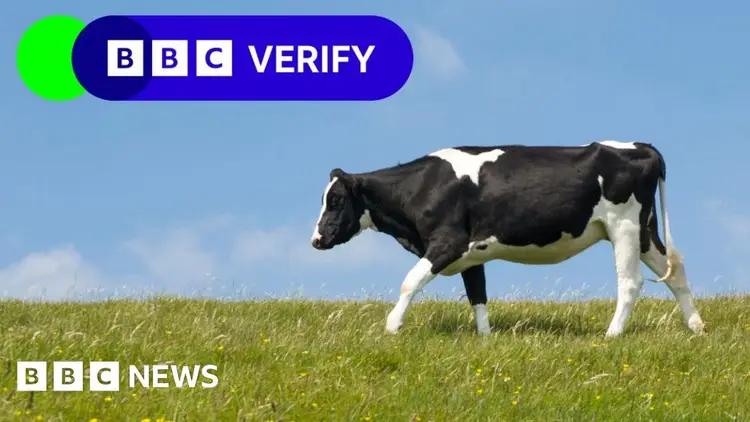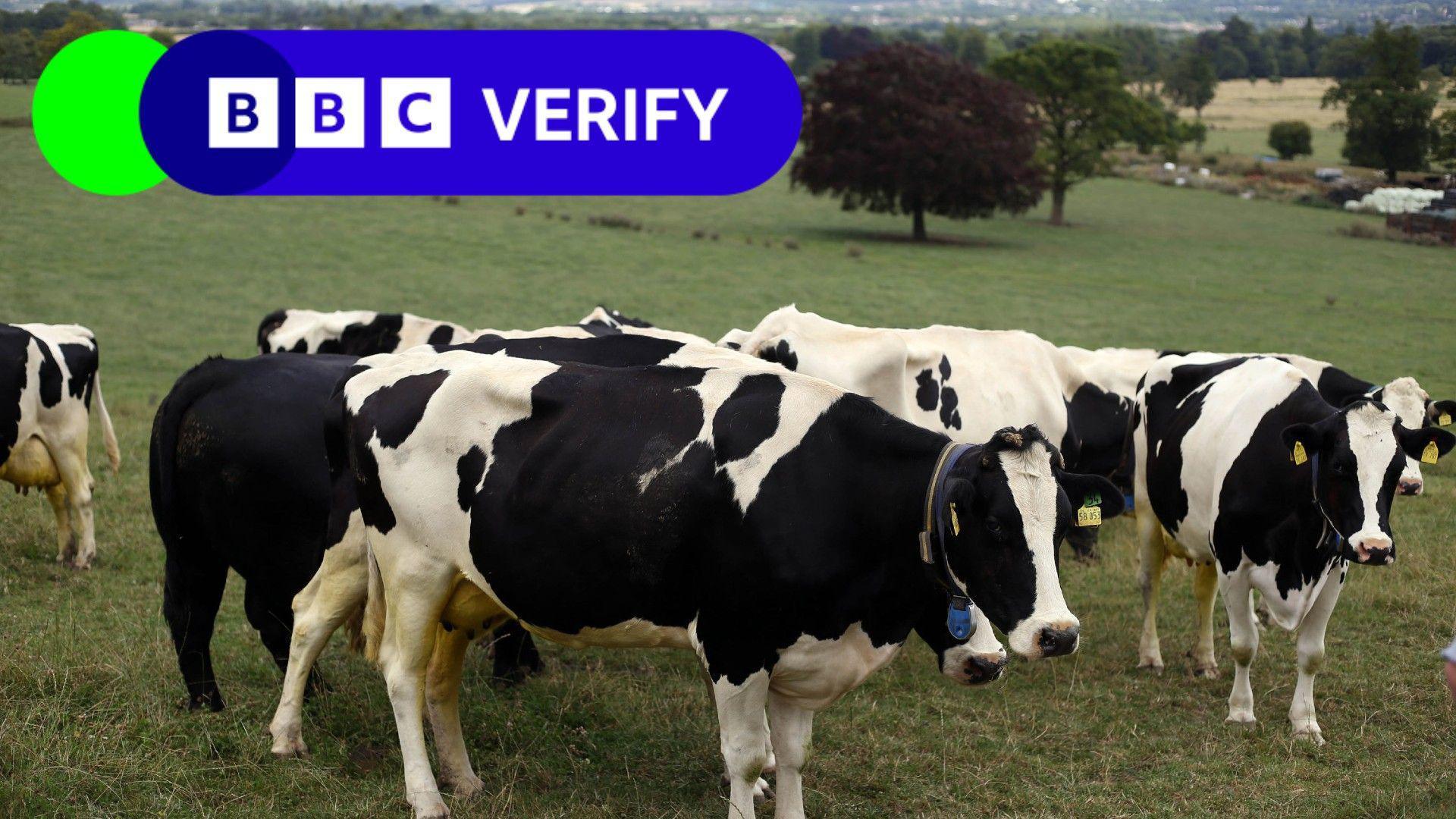Why has new additive Bovaer prompted people to throw Arla milk away?

Why Are People Pouring Milk Down The Drain?
Source of the image, PA Media
Nick Eardley, Matt Murphy, Olga Robinson, and Marco Silva

Certain social media users in the UK have been dumping milk into their sinks and toilets to protest the testing of a new feed additive that supposedly lowers methane gas emissions in dairy cows significantly.
Arla Foods, a company from Denmark and Sweden that operates the largest dairy cooperative in the UK, revealed last week that 30 of its farms throughout the country will be trialing an additive called Bovaer.
The company reports that Bovaer, when mixed in small amounts into cattle feed, has the potential to cut methane emissions from cows by about 30% to 45%.
UK regulators have given their approval for its use, and a number of major grocery stores will offer milk from cows that have been fed the additive.
Several internet users have expressed worries about the safety of certain ingredients in Bovaer, questioning whether they are safe to use.
Nevertheless, specialists have informed the BBC that the additive "does not present any concerns regarding food safety."
Some shoppers are considering a boycott of well-known supermarket products in response to the trial. Meanwhile, several farmers have turned to social media to let customers know that they do not use Bovaer.
At the same time, unfounded rumors suggesting that it is connected to a “depopulation” scheme have emerged online, along with false information regarding its association with US billionaire Bill Gates.
The company, DSM-Firmenich, has claimed that falsehoods and inaccurate information have circulated regarding its product. They assert that it is completely safe for use and has undergone extensive testing over the years in various countries.
Insights On Bovaer And Its Latest Trial
Methane is a significantly stronger greenhouse gas compared to carbon dioxide and plays a major role in accelerating climate change.
Cows generate it while their stomachs are processing tough fibers, such as grass, to aid in digestion. During this fermentation, methane gas is produced, which is primarily released back into the atmosphere when they burp.
Bovaer helps reduce the enzymes in a cow's stomach that produce gas. According to the National Farmers Union (NFU), when this additive is used properly, it gets broken down during the cow's digestion process, meaning it doesn't end up in the milk or meat.
DSM-Firmenich reports that the additive can be purchased in 68 countries across the globe.
In its testing phase, Arla Foods is collaborating with major UK supermarkets such as Tesco, Morrisons, and Aldi, which will carry products made from milk sourced from cows that have consumed the additive.
Claims About Bovaer: What You Need To Know
After Arla revealed the trial, Bovaer has faced an overwhelming number of assertions and discussions on the internet.
One of the individuals expressing worries is Reform UK MP Rupert Lowe. He mentioned on X that he has requested the Department for Environment, Food and Rural Affairs to conduct a swift assessment of the additive.
At the same time, several dairy farmers have stated that they won't use the feed due to worries about certain substances involved in the production of the additive.
Bovaer is composed of silicon dioxide, propylene glycol, and an organic substance called 3-nitrooxypropanol, or 3-NOP for short.
Leading grocery chains like Tesco, Aldi, and Morrisons have all agreed to participate in the trial.
Critics of the additive have referenced a report from the FSA published last year, which stated that "3-NOP" should be seen as corrosive to the eyes, an irritant to the skin, and possibly harmful if inhaled by people working with it.
However, specialists pointed out that there are no remnants of Bovaer or its components in milk or other dairy products because it gets fully digested in a cow's stomach.
Professor Chris Elliott, a specialist in food safety and microbiology at Queens University Belfast, stated in an interview with the BBC that the product has undergone various regulatory evaluations globally. He noted that these assessments have confirmed its effectiveness in addressing methane emissions and that it does not raise any concerns regarding food safety.
Some critics have raised concerns that 3-NOP might lead to cancer, but UK regulators evaluated these claims and determined that “the additive is not cancer-causing at the suggested usage level.”
The FSA informed the BBC in a statement that milk from cows that were fed Bovaer, a feed supplement designed to lower methane emissions, is safe for consumption.
"Bovaer has passed thorough safety evaluations and has received approval for use in Great Britain."
In a comment to the BBC, Arla stated that the safety issues circulating on the internet are “entirely untrue.”
Why Is Bill Gates Involved In Controversy?
Several individuals posting online have claimed that Bill Gates, the founder of Microsoft, is involved in creating Bovaer. However, the company developing the additive has strongly refuted this assertion.
In a statement released on December 2, DSM-Firmenich asserted that it has completely developed Bovaer and highlighted that the company does not have any additional investors.
"The statement clarified that Bill Gates is not participating in the creation of Bovaer."
The billionaire from the United States has chosen to put his money into a competing start-up called Rumin8, which is working on a product aimed at reducing methane emissions.
Mr. Gates has been the focus of various conspiracy theories for quite some time, with some of the more outrageous ones suggesting that he is involved in a plan to reduce the global population.
Certain online activists have tried to connect Bovaer to these allegations by referencing an earlier approval letter from the US Food and Drug Administration (FDA), which indicated that the additive might result in male infertility.
However, the letter was discussing safety measures that should be followed when dealing with the product in its unaltered state, not when it’s mixed into animal feed.
Jack Bobo from the University of Nottingham Food Systems Institute explained to the BBC that the worries seemed to arise from a misinterpretation of the FDA's approval letter.
The letter points out the necessary safety measures for working with Bovaer because of its main component, 3-nitrooxypropanol. It's crucial to understand, though, that this ingredient does not end up in the finished dairy product.
The Online Debate: What Happened?
Discussions surrounding Bovaer seem to have begun almost right away following Arla's announcement of its intended trial on November 26.
As of December 3rd, its announcement on X about teaming up with Tesco, Aldi, and Morrisons has garnered almost 6 million views and received thousands of comments.
Individuals known for promoting conspiracy theories quickly began commenting on the trial just hours after it started. Some of these commenters have previously shared content that opposes vaccines and denies climate change.
On the other hand, some users seem to be posting about the additive out of real worry.
As reported by the social media analysis company Brandwatch, references to Bovaer on X surged from nearly none to more than 71,000 shortly after the trial was made public.
In the meantime, TikTok videos critiquing the product have garnered as many as 1.8 million views each.
Many popular posts have shown users throwing out packages of Arla's Lurpak butter and dumping cartons of milk, with one caption reading: "Not in my home."
According to the National Farmers Union, 15 years of testing have demonstrated that Bovaer poses no threat to either consumers or animals. It breaks down in a cow's digestive tract, meaning it doesn't remain in milk or meat.
Visuals created by Christine Jeavans.









































